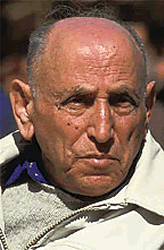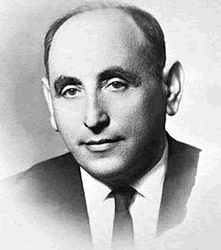Isser Harel /Halperin

Isser Harel, born Isser Halperin on 1912, died 18 February 2003) was spymaster of the intelligence and the security services of Israel and the Director of the Mossad (1952 - 1963).
Isser Harel was born in Vitebsk, Russia (now Belarus) to a large, wealthy family. The exact date of his birth was not passed on to him because the book of Gemara in which the date was recorded was lost in the migrations of the Russian Revolution of 1917 and World War I. The family had a vinegar factory in Vitebsk. It was a gift of his maternal grandfather, who had a concession to make vinegar in large parts of Tsarist Russia. Young Isser was five years old when the revolution broke out and Vitebsk passed several times between the Whites and the Reds. On one occasion he saw Leon Trotsky give a speech in the town.
Isser and his family fell on hard times when the Soviet regime confiscated their property. In 1922 the family emigrated from the Soviet Union to Dvinsk in independent Latvia. On the way, Soviet soldiers stole their suitcases, which contained the rest of their possessions. In Dvinsk, Isser began his formal studies, completed primary school, and began secondary school. As he grew, a Jewish national consciousness grew within him and he joined a Zionist youth organization.
When he was 16, Isser began preparations to immigrate to Israel. During this preparatory year he worked in agriculture with the aspiration to join a kibbutz.
With the outbreak of the 1929 Hebron massacre, his friends decided to move up their immigration date in order to reinforce the Jewish settlement in Palestine. Documents were prepared for the 17-year-old Isser stating that he was 18 and eligible for a British visa. At the beginning of 1930 he immigrated to Israel. He crossed Europe from north to south to board a ship in Genoa, carrying a pistol that he concealed in a loaf of bread.
He had one child, a daughter, from his first marriage. She currently works for the Shabak (General Security Service) in Israel. She did not serve in the Israeli Defense Forces but instead in the National Work Program which is an alternative for women who do not or cannot serve the mandatory 18 months in the I.D.F.
[] Mossad Chief
On September 22, 1952, Harel became head of the Mossad. Harel became the first man to be given the Hebrew title of HaMemuneh (the responsible one), a reference to his unique position as the head of both Israeli civilian intelligence services, Mossad and Shabak.
Harel was the head investigator in the 15 year manhunt for Adolf Eichmann. The hunt ended in May 1960, when the Mossad covertly kidnapped Eichmann from Argentina to Israel. Eichmann was the man responsible for technical coordination of the Final Solution in WWII, which resulted in the systematic murder of 6,000,000 Jewish people. Harel documented his 15 year investigation in "The House on Garibaldi Street".
He was replaced as head of Mossad after it became known that many of his agents had misappropriated funds. Since then, Mossad agents working on foreign soil have to "earn" their money through business activities, which also enhances their cover.
] Political career
After leaving Mossad, Harel turned to politics. He joined David Ben Gurion's newly created National List prior to the 1969 elections, and was elected to the Knesset as the party won four seats. However, after Ben Gurion resigned from the party it began to disintegrate, with two of the MKs defecting to Likud and the other to the Alignment. As a result, Harel lost his seat in the 1973 elections.
[] Bibliography
* The Great Deceit: a Political Novel (1971) (Hebrew)
* Jihad (1972) (Hebrew)
* The House on Garibaldi Street (1975) (Hebrew)
* The Anatomy of Treason (1980) (Hebrew)
* Operation Yossele (1982) (Hebrew)
* The Crisis of the German Scientists (1982) (Hebrew)
* Brother Against Brother: the Authorized Comprehensive Analyses of the Lavon Affair (1982) (Hebrew)
* The Truth About the Kastner Murder (1985) (Hebrew)
* Soviet Espionage (1987) (Hebrew)
* Security and Democracy (1989) (Hebrew)
Issar Harel, Israeli spymaster behind Eichmann capture, dies at 91
From:
Jewish Telegraphic Agency
Date:
February 20, 2003
Author:
Segal, Naomi
More results for:
issar harel | Copyright information Provided by ProQuest LLC.
Segal, Naomi
Jewish Telegraphic Agency
02-20-2003
JERUSALEM, Feb. 19 (JTA) -- Issar Harel, the Israeli master spy responsible
for the capture of Nazi war criminal Adolf Eichmann, died this week at 91.
Harel, one of the founders of Israel's intelligence community, led the
Shin Bet domestic security service for 15 years and the Mossad foreign
intelligence agency for 11 years.
Between 1952 and 1963, he simultaneously headed both agencies, and was
considered responsible for establishing their worldwide reputations.
Among the most significant achievements during this period was the 1961
kidnapping of Eichmann in Buenos Aires, an operation Harel later recounted
in his book, "The House on Garibaldi
From The Times
February 20, 2003

Isser Harel
Head of Israeli intelligence who engineered the abduction of Adolf Eichmann from Argentina
The first director of Shin Bet, Israel's domestic security agency, and for more than a decade the head of Mossad, the country's foreign Intelligence agency, Isser Harel was responsible for Mossad's most famous operation: the abduction of Adolf Eichmann. Known as "Little Isser" — he was only 5ft tall — Harel played a leading part in establishing both organisations, amassing a great deal of personal power in the process. He also ensured that their reputations were maintained, particularly by supervising the kidnapping of Eichmann in Argentina in 1960. The Nazi, who had been responsible for the murder of millions of Jews, was tried in Israel the following year and executed there in 1962.
The operation made Harel a national hero in Israel, though he maintained that his work was a matter of duty and information-gathering rather than heroics. He resigned in 1963 after a dispute with the Prime Minister, David Ben-Gurion, to whom he had been close; he then became a member of parliament and published a book about the Eichmann affair.
He was born Isser Halperin in Byelorussia, moving to Palestine in 1930 and changing his name before helping to set up a kibbutz and an orange-packing business.When the Second World War broke out, Harel joined the Haganah, the underground Jewish militia, and he later moved to Shai, its intelligence section; he gathered information on the British, who controlled Palestine, and on the Arabs. Although he found it hard to express himself, he soon impressed his seniors.
When Israel declared its independence in 1948, Harel became the first Director of Shin Bet, with responsibility for domestic intelligence. As it was a new organisation, he could select all his agents carefully; many were non-Jews and some did not even know that they were working for Israel. As a member of Ben Gurion's ruling party, Mapai, he also followed the activities of political rivals, keeping under surveillance those who were suspected of links with the Soviet Union.
In 1952 Harel became Director of Mossad, but he remained a powerful figure in Shin Bet. With many new recruits from Irgun and the Stern Gang, his tasks included preventing other agencies from recruiting his agents and encouraging covert Jewish immigration from Arab countries. He later revealed that he had smuggled thousands of Moroccan Jews to Israel by co-operating with the Franco regime in Spain and bribing local officials, making several visits there in the late 1950s and early 1960s. "I thought all along they wanted to make a gesture to the Jewish people to make up for Spain's close ties with Hitler and Mussolini during the war," he later said.
Harel's most public triumph came in 1960, when he was in Buenos Aires, overseeing the operation to kidnap Adolf Eichmann. Once Israeli agents had confirmed that the balding businessman called Ricardo Klement was Eichmann — who had been so keen to distance himself from his past that he had removed his SS tattoo — Mossad decided to kidnap him. Harel was sure that the former Nazi would disappear if the Israeli Government tried to extradite him formally.
It was said that Eichmann's military discipline — which allegedly meant that once captured he would eat only when ordered to do so — would make it easier to locate and abduct him. But on the day, May 11, he missed his bus home; and when he did appear, the hand that he had in his pocket led the Israelis to believe, erroneously, that he was holding a gun. (There had been other hitches, not least from unreliable hire cars.) As he turned into Garibaldi Street, in a lower-middle-class area outside the capital, he was thrown by three men into a waiting car. He was then held for nine days before being sedated and accompanied on an El-Al flight dressed as a crew member. He was flown back to Israel on a plane carrying Abba Eban, who had been celebrating Argentina's 150th anniversary. On arriving in Israel, Harel went to Ben-Gurion and told him: "I've brought you a present."
"I didn't do it with enthusiasm," Harel said in 1972. "I wasn't happy, but the extermination of six million Jews wasn't a regular thing. So dealing with Nazi criminals shouldn't demand the usual way of reasoning." He said that his own law was the law of the community.
He described the capture in The House on Garibaldi Street, which became a bestseller (and which was made into a television film starring Topol and Janet Suzman, with Harel played by Martin Balsam and Ben-Gurion by Leo McKern). The publication followed frequent battles with Israeli censors and some of Harel's juniors felt that they were not given the credit that they deserved. Harel said on its publication: "I want to show not just the anatomy of that operation, but the motivation of our Intelligence officers . . . The importance of Eichmann was not his capture but his trial."
In the year of the trial, 1961, Harel began another campaign — which would lead to his downfall — against German scientists who were helping Nasser's Egypt to develop rockets that could reach Israel. At a time when Israel was seeking to improve relations with Germany, this led to a dispute with Ben-Gurion, and in 1963 Harel was forced to resign as director of Mossad.
Two years later he became an adviser to the Prime Minister, Levi Eshkol, before resigning a year later, claiming that he was being denied information. Between 1969 and 1973 he served in the Israeli Parliament.
During the 1980s and 1990s the debate about Eichmann continued. Many had credited his discovery to Simon Wiesenthal, but Harel denied this. There were similar debates about whether Harel could have caught the physician Josef Mengele; he maintained that it was Wiesenthal whose public declaration of intent led Mengele to flee when Mossad was closing in.
Harel was also criticised for his expensive efforts to find Jossele Shuchmacher, the secular boy who had been abducted by Orthodox Jews and taken to America. In his later years, when he ran a family business, he spoke in public about Israeli spy missions and various threats to the country. When he was intelligence chief he had been anonymous, known only as ha memuneh, the boss.
He was married and had one daughter.
Issar Harel, head of Mossad, 1952-63, was born in Vitebsk, Byelorussia, in 1912. He died in Petah Tiqwah, near Tel Aviv, on February 18, 2003, aged 91.